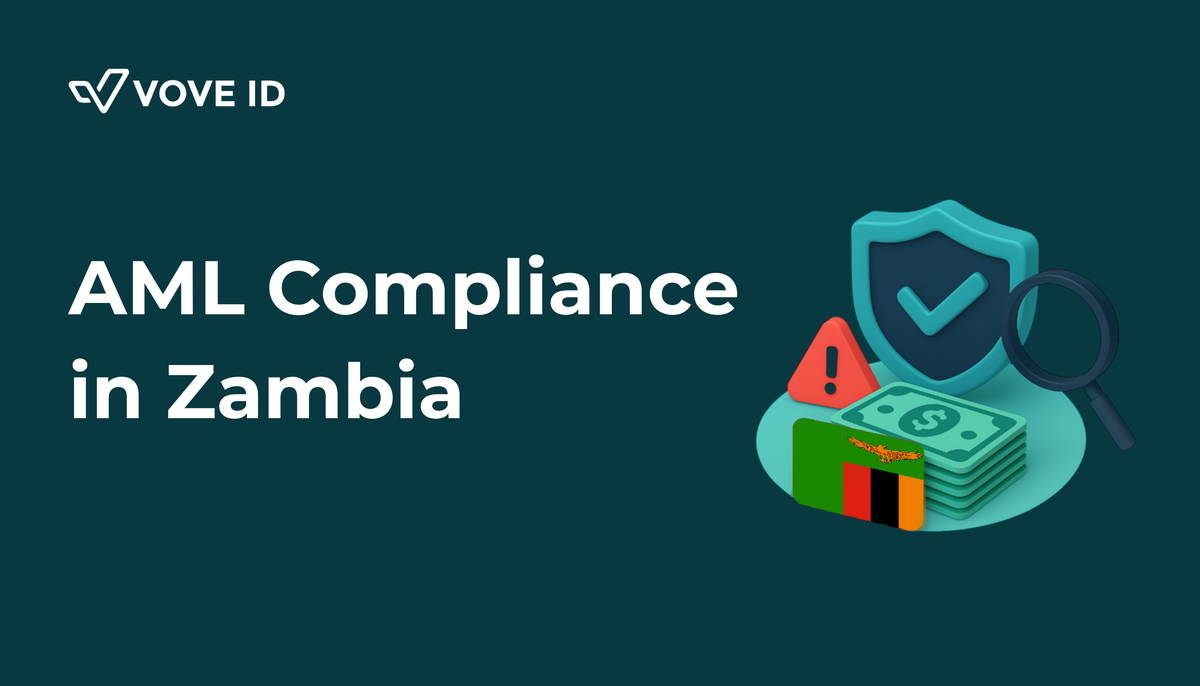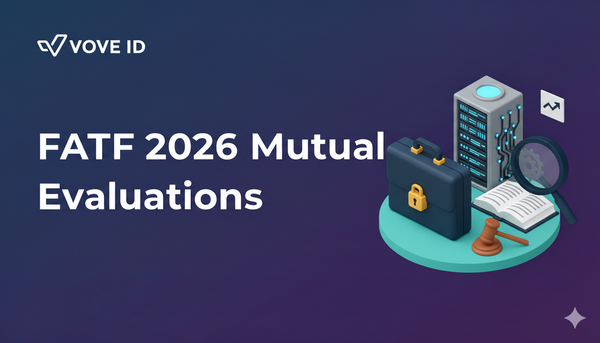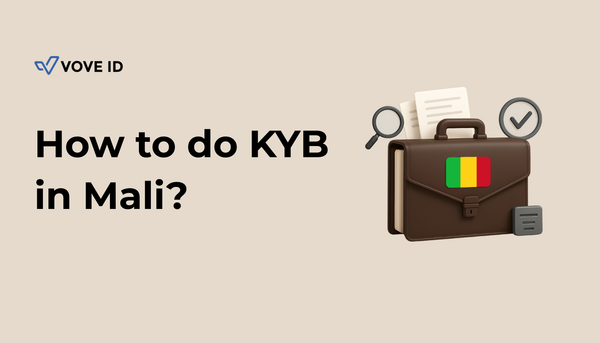AML Compliance in Zambia, 2025: A Practical Guide for Fintechs and Regulated Businesses
A 2025 guide to AML compliance in Zambia covering new BoZ rules, FIC oversight, PACRA and IPRS updates, and how VOVE ID helps automate AML workflows.

Zambia is tightening its AML and CFT controls as regulators push for stronger oversight, cleaner financial flows, and better detection of high-risk activity. Fintechs, payment companies, digital wallets, crypto platforms, and other regulated businesses are now expected to demonstrate deeper due diligence, sharper monitoring, and structured reporting as part of daily operations.
At the same time, digital identity infrastructure is finally maturing. With new APIs from IPRS and growing adoption of identity platforms such as VOVE ID, compliance teams can automate large parts of onboarding and monitoring that previously required slow manual checks.
This guide summarises the core AML requirements in Zambia for 2025 and shows how businesses can stay compliant while preparing for stricter supervision. It also connects to our dedicated guides on KYC Zambia and KYB Zambia, which expand on identity verification and business verification requirements in more detail.
Regulatory Framework: Who Governs AML/CFT in Zambia in 2025
By 2025, Zambia’s AML landscape is mainly shaped by four authorities:
1. Financial Intelligence Centre (FIC)
The FIC remains the primary intelligence authority for detecting and analysing suspicious financial activity. In 2025 the FIC has significantly increased oversight of fintech and crypto operators, issuing more requests for information and applying higher scrutiny to cross-border transactions and new corporate clients.
2. Bank of Zambia (BoZ)
BoZ supervises banks, PSPs, mobile money operators, fintechs, and crypto-linked financial services. In October 2025, BoZ released updated AML/CFT Guidelines for DNFBPs and Fintechs, introducing:
- A 10 percent minimum UBO threshold for customer due diligence
(previously 25 percent in some categories) - Broader obligations on digital onboarding
- Stronger sanctions for AML failures
- Stricter expectations around transaction monitoring
In 2025 BoZ also issued Supervisory Note 02/2025, prohibiting banks from closing accounts of mobile money operators or agents merely because they fall under a “high-risk” category. The directive aims to stop over-de-risking, a recurring challenge for the digital payments sector.
3. National AML/CFT Policy Coordinating Committee
After the 2023–2024 restructuring, Zambia no longer uses the older AMLA (Anti-Money Laundering Authority) terminology. Policy coordination now runs through the National AML/CFT Committee under the Ministry of Finance, which synchronises supervision across law enforcement, the FIC, BoZ, and other agencies.
4. National Prosecution Authority (NPA)
The NPA has strengthened its AML enforcement capabilities after the launch of the AML/CFT Capacity Building Programme for Prosecutors and Investigators in late 2024. Prosecutors are now better trained to handle financial crime cases, and enforcement actions are expected to increase throughout 2025.
What Changed in 2025: Key Updates That Affect Fintechs
1. Lower UBO Threshold: 10 percent
Fintechs and regulated entities must now identify any individual owning or controlling 10 percent or more of a corporate customer. This requires deeper documentation, enhanced screening, and more exhaustive verification workflows.
2. More FIC Requests to Crypto and High-Growth Fintechs
The FIC reported a rise in queries and intelligence requests specifically targeting corporate clients of fintech and crypto businesses. Several high-profile fines in 2025 highlight the need for stronger corporate monitoring and timely STR submissions.
3. PACRA’s New Beneficial Ownership Portal With API Access
Since mid-2025, PACRA has launched a new online portal with API access to its beneficial ownership registry. Access is restricted to regulated entities and requires a paid subscription, but it significantly speeds up KYB and UBO verification.
4. IPRS Opens Limited API Access
Since March 2025 the IPRS under the Ministry of Home Affairs began offering limited API access through Smart Zambia Institute. The access is still expensive and tightly controlled, but it marks a major shift in Zambia’s digital identity infrastructure and enables faster KYC automation.
AML/CFT Requirements for 2025: What Businesses Must Implement
Customer Due Diligence (CDD)
Fintechs must verify:
- Natural person identity through NRC, passport, or accepted digital methods
- Business registration, beneficial owners, and directors
- Source of funds for higher-risk categories
Using a digital verification provider like VOVE ID helps automate NRC and passport checks, biometric identity confirmation, and AML screening workflows during onboarding.
Enhanced Due Diligence (EDD)
Required for:
- PEPs
- High-value transactions
- Cross-border crypto flows
- Businesses with complex ownership
- High-risk industries
EDD must be documented, risk-rated, and reviewed on an ongoing basis.
Ongoing Monitoring
Businesses must maintain:
- Automated transaction monitoring
- Screening against sanctions lists
- Review triggers for repeated high-risk behaviour
- Continuous UBO monitoring for businesses
Suspicious Transaction Reporting
All STRs must be submitted to the FIC. Timeliness, completeness, and consistency with the business’s internal AML risk assessment are essential.
Operational Challenges That Fintechs Face in 2025
- Higher expectations with limited internal compliance capacity
Many early-stage fintechs still operate with small compliance teams. - Still-expensive access to identity and BO data APIs
Both IPRS and PACRA APIs require paid subscriptions and strict onboarding procedures. - Complex cross-border flows
Crypto and remittances remain high-scrutiny segments. - Pressure to avoid over-de-risking
BoZ’s 2025 directive means businesses must justify risk classification with evidence, not assumptions.
How VOVE ID Helps Fintechs Stay AML-Compliant in Zambia
VOVE ID supports regulated businesses in Zambia with:
- NRC and passport verification through automated checks
- Biometric verification with liveness detection
- AML screening against global and local watchlists
- KYB verification with UBO mapping
- API integrations aligned with PACRA and IPRS requirements
In 2025, a leading mobile wallet in Zambia reduced manual review time by 70 percent after integrating VOVE ID for identity verification and AML screening. This improvement helped the team minimise false positives, speed up onboarding, and maintain a cleaner risk profile.
Conclusion
AML rules in Zambia are becoming stricter, especially for fintech and crypto-linked sectors. Regulators expect deeper verification, stronger monitoring, and transparent reporting. With new data sources like PACRA’s BO API and limited IPRS access, businesses finally have tools to automate much of their compliance workload.
Pairing these developments with trusted verification solutions such as VOVE ID enables faster onboarding, cleaner risk management, and long-term compliance readiness.
If you want faster onboarding, cleaner risk controls, and AML workflows that scale with your business in Zambia, talk to us about integrating VOVE ID.




